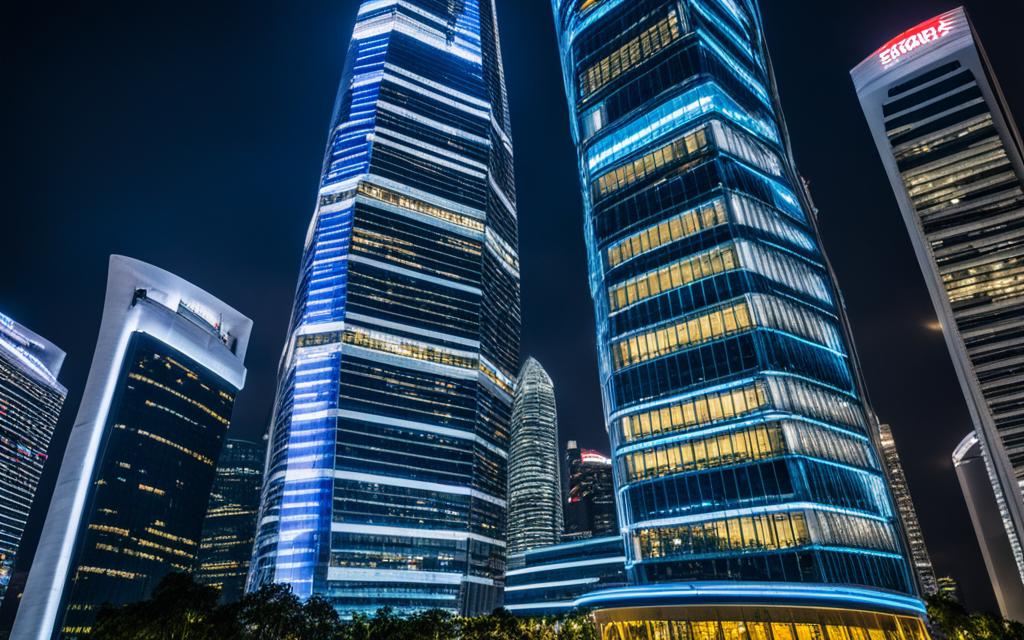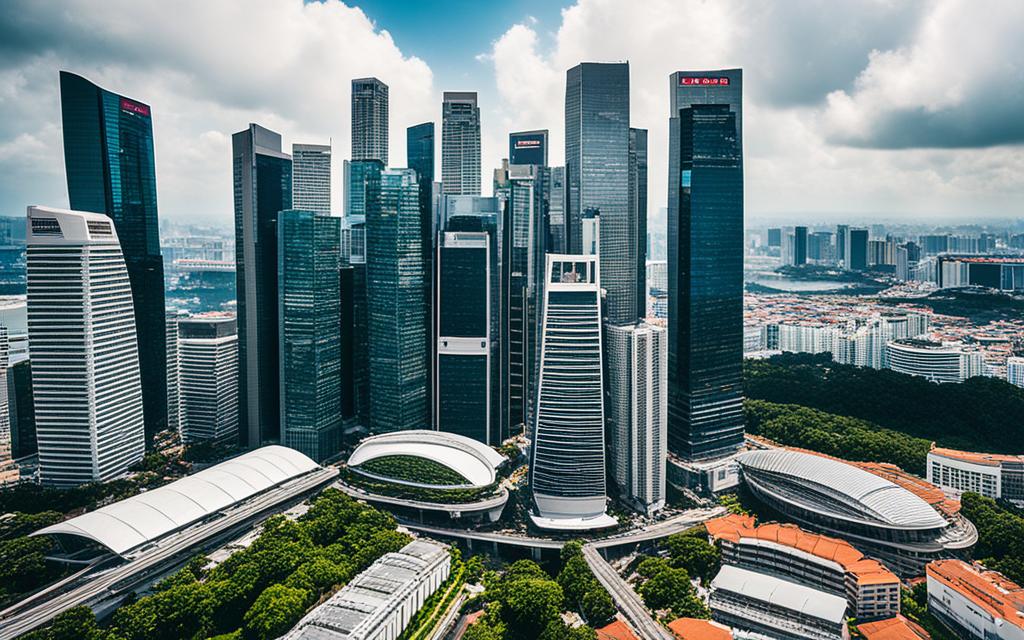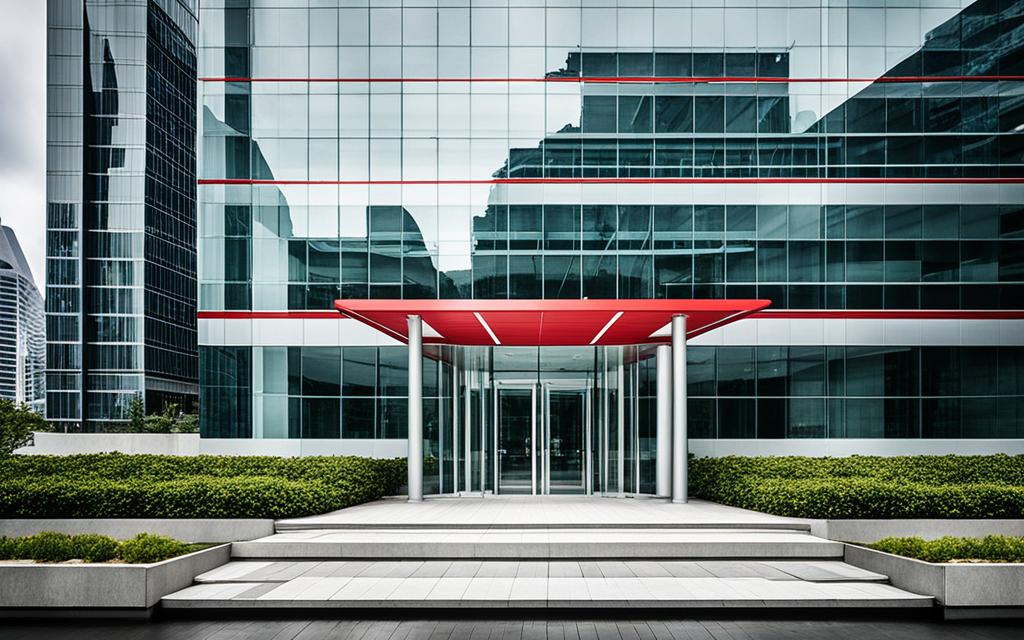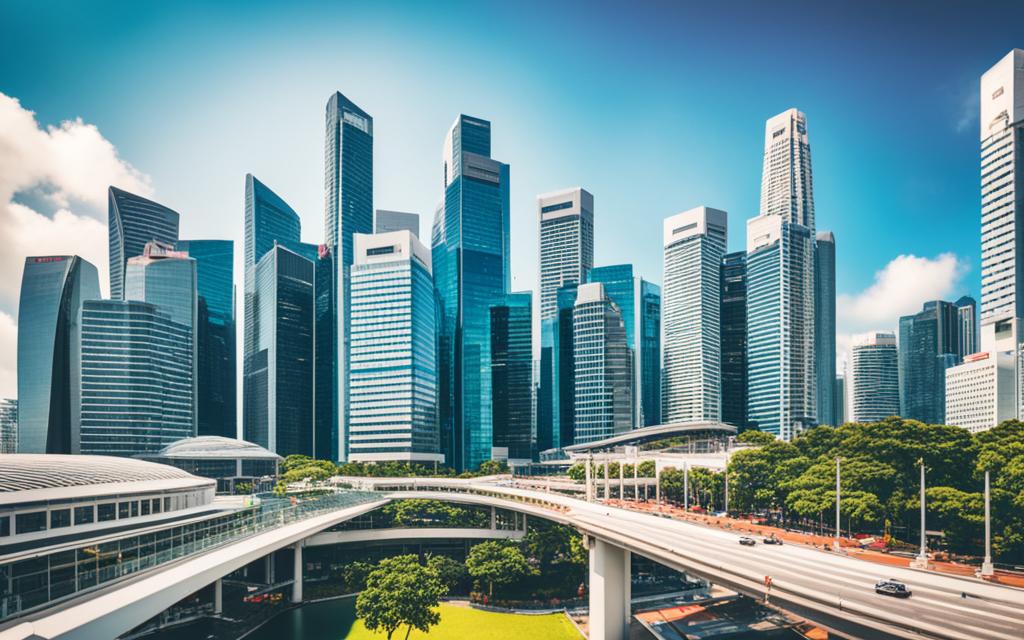
As a beacon of commercial excellence, Singapore’s real estate landscape offers promising avenues for investors eyeing Singapore Commercial Property. The city-state, known for its strategic position in Southeast Asia, not only attracts multinational corporations but also serves as an incubator for thriving businesses seeking office space for rent in Singapore. With a steadfast commitment to fostering a pro-business environment, Singapore’s market features a diverse assortment of investment opportunities, ranging from sleek high-rise offices to bustling retail spaces, all encapsulated within the vibrant realm of commercial real estate in Singapore.
The absence of Additional Buyer’s Stamp Duty (ABSD) on non-residential properties presents a striking advantage for international investors, while the flat 10% property tax rate sweetens the pot further, establishing Singapore commercial and industrial properties as sound, financially alluring investments. The landscape ahead is ripe with possibilities for discerning investors looking to navigate the nuanced terrain of Singapore’s commercial real estate, where strategic fiscal benefits align with a robust demand for quality leasing spaces.
The Thriving Landscape of Singapore Commercial Property Investment
Singapore’s robust economy and strategic position in Asia have fostered a dynamic market for both commercial and industrial properties. Investors from around the globe are attracted to the region, not only for its stability and growth but also for the favorable investment conditions that the city-state offers. The exemption of Additional Buyer’s Stamp Duty (ABSD) has particularly enhanced the investment landscape, offering financial benefits that are not present in many other markets. Below, we delve deeper into the intricacies of Singapore’s commercial property sector and the advantages that beckon foreign investors to its shores.

Understanding Singapore’s Commercial and Industrial Property Sectors
Distinguishing between the various property types within the Singapore commercial property market is crucial for investors. Specific zones, such as those allocated for retail shops, office spaces, and medical suites—or even industrial categories like B1 light industrial properties and B2 general industrial properties—each come with their own set of rules and potentials. Recognizing where these types of industrial property in Singapore are located and how they can serve your investment goals is the first step towards capitalizing on the thriving commercial real estate scene in the region.
Investment Climate for Foreigners in Singapore’s Real Estate Market
- No ABSD: A significant lure for foreign investors is the absence of ABSD on commercial and industrial property in Singapore, offering a financial incentive compared to residential investments.
- Market Accessibility: The Singapore market is remarkably accessible to foreign entities, allowing international interests to participate without restriction.
The friendly business laws and exemption from ABSD on commercial property for sale in Singapore generate a conducive environment that encourages foreign capital influx—a cornerstone of the city’s growth strategy.
The Impact of ABSD Exemptions on Foreign Investors
The stamp duty landscape in Singapore is uniquely favorable to foreign investors. By granting exemptions for the purchase of commercial properties, including offices and retail spaces within the Singapore commercial property market, international investors enjoy a competitive edge. This distinctive feature of Singapore’s taxation system has not only incentivized further investment from abroad but has significantly contributed to the sector’s appeal and vitality.
Strategic Approaches to Commercial Real Estate in Singapore
In the dynamic arena of investing in Singapore commercial real estate, the successful investor pays heed to a variety of strategic considerations that ensure sustained profitability and growth. Unlocking the potential of the best commercial properties in Singapore demands a nuanced understanding of the market’s intricacies and a keen eye for prime locations.
The nexus between tenant quality, property location, and rental longevity forms the foundation for lucrative investments. Locations within reach of efficient transport systems inherently provide higher visibility and accessibility, translating to greater customer footfall for retail ventures, and an attractive factor for office rentals. Here are some foundational strategies for optimizing your investment in Singapore’s commercial real estate market:
- Target high-traffic areas for retail spaces, ensuring maximum exposure to shoppers and passersby.
- Invest in properties with modern facilities that appeal to high-quality tenants seeking long-term leases.
- Understand the business ecosystem in Singapore, aiming to choose locations that are strategic to specific industries and sectors.
For those considering industrial spaces, such as warehouses or factories, it’s imperative to factor in zoning laws and the specific operational needs of potential tenants. The right industrial space in the correct zone can significantly maximize investment returns, particularly if it caters to the needs of growing sectors in the economy.
- Pinpoint industrial properties situated in zones that cater to the type of operation your potential tenants will run.
- Evaluate the accessibility of these properties for logistics, considering factors like proximity to expressways and ports.
- Assess the layout and specifications of industrial properties to ensure they meet the demands of future tenants’ operations.
Investing smartly in Singapore’s commercial real estate landscape means each decision should be informed by a thorough understanding of the market conditions, economic trends, and the regulatory environment. Combining these factors with strategic location and property selection forms a robust approach to investment that promises to yield beneficial results.
Key Factors Driving the Singapore Commercial Property Market
Within the bustling economic landscape of Singapore, the commercial real estate sector continues to exemplify investment prowess, largely owing to an ensemble of benefits ranging from higher rental yields to attractive lease terms. Recognizing these core factors is essential for investors considering a foray into the vibrant Singapore commercial property market.

The Allure of Higher Rental Yields and Long-term Leases
Commercial real estate in Singapore stands apart from the residential market, primarily due to the tantalizing rental yields it offers. These lucrative yields are a magnet for investors seeking steady income streams. Far surpassing the more transient nature of residential leases, the industrial property sector in Singapore is particularly noted for its long-term agreements. Such leases often span multiple years, securing a reliable cash flow for property owners and reducing the churn associated with tenant turnovers.
Diversification Benefits of Commercial vs Residential Sector
The Singapore commercial property market affords investors an opportunity to diversify their investment portfolios. In contrast to the more volatile residential sector, commercial properties tend to be less susceptible to economic downturns. This resilience makes commercial real estate in Singapore an attractive hedge against market instability, ensuring investors maintain a balanced and robust investment portfolio.
Prospects of Capital Appreciation in the Dynamic Southeast Asian Hub
The capital appreciation potential within the commercial and industrial property segments in Singapore is significant. With the Singaporean government’s commitment to maintaining the nation’s status as a leading commercial hub in Southeast Asia, there is continuous infrastructural development and policy support that boost investor confidence. The burgeoning growth sectors, chiefly technology and finance, are expected to drive demand for office spaces, underpinning the long-term prosperity and capital appreciation of properties situated in this dynamic hub.
Financial Considerations for Purchasing Singapore Commercial Property
Investing in commercial real estate within Singapore necessitates a thorough understanding of the financial landscape that underpins commercial property transactions. The absence of Additional Buyer’s Stamp Duty (ABSD) represents a compelling fiscal incentive for investors, as it lowers the entry barrier financially when compared to the residential market. This distinctive feature of the Singaporean market has made the pursuit of commercial property for sale in Singapore increasingly popular among discerning investors.
However, while the allure of savings on stamp duties is significant, there are other key financial considerations to keep top of mind:
- Seller’s Stamp Duty (SSD) may apply to certain industrial assets, a detail to be verified prior to finalizing any sale agreements.
- Goods and Services Tax (GST) implications must be accounted for when the transaction involves GST-registered entities. The ability to reclaim GST is a consideration that can affect the overall investment calculus for GST-registered buyers.
- The choice between personal versus corporate tax rates can influence purchasing strategies, with corporate entities typically enjoying a flat 17% rate, which may be more advantageous depending on individual circumstances.
- Variations in leasehold terms can dramatically impact the long-term viability and cost-efficiency of an investment.
- Total Debt Servicing Ratio (TDSR) guidelines govern financing, shaping how much capital can be borrowed and under what conditions for the purchase of office space for rent in Singapore.
Each of these factors can profoundly affect the profitability and sustainability of your investment in commercial real estate. A calculated approach, one that comprehensively assesses all financial nuances, is essential for success in the vibrant Singapore market.

Investing in Singapore Commercial Property: Risks and Legalities
Delving into the realm of Singapore commercial property does not come without its complexities. Before reaping the benefits that investing in Singapore commercial real estate can offer, one must carefully consider various risks and legal stipulations that stand as an integral part of the venture.
Navigating the Higher Costs and Specialized Property Features
Investors must be prepared to tackle the substantial investment costs, which are often magnified by the specialized nature and expansive scales of commercial properties. These extensive upfront expenses can include but are not limited to:
- Enhanced deposits for commercial loans
- Fit-out costs for tenant-specific requirements
- Higher renovation expenses for commercial standards
Singapore’s diverse commercial properties, each with unique features, demand investors to possess a refined understanding of market segments they opt to invest in.
Recognizing and Preparing for Potential Market Volatility
Amidst the allure of Singapore’s robust commercial real estate market, investors should brace themselves for the unpredictable nature of economic shifts:
- Stay abreast of global and regional economic trends
- Assess the impact of local policy changes on property values
- Develop a risk mitigation strategy for times of downturn
Such precautions are indispensable in securing the resilience of an investment portfolio against the tides of market volatility.
Regulatory Compliance and Tax Implications for Investors
Regulatory compliance is critical when investing in commercial properties. A deep appreciation of the Urban Redevelopment Authority’s (URA) guidelines, especially for conservation properties and leaseholds, is fundamental:
- Adherence to development charges for property enhancements
- Understanding of the permitted use of different commercial spaces
- Compliance with building safety codes and regulations
Moreover, Singapore’s tax framework presents layered implications ranging from a 10% property tax to Goods and Services Tax considerations. Being adept in such financial nuances is a cornerstone for a profitable investment journey.

Ideal Profiles for Singapore Commercial Property Investors
Investing in the best commercial properties in Singapore requires a discerning eye and an understanding of the market’s subtle complexities. The ideal investor profile encapsulates a mix of seasoned local entrepreneurs and global entities who appreciate the nuances of the dynamic commercial real estate Singapore landscape. Adept investors often possess an intimate knowledge of particular industries, granting them foresight in property selection to perfectly match the demands of future tenants.
- Local entrepreneurs skilled in navigating the regional market nuances and leveraging connections for commercial success.
- Foreign corporations and investors attracted by Singapore’s economic stability and strategic position in Asia.
- Investment groups familiar with the logistics or retail sectors, positioning them advantageously for identifying retail spaces with high foot traffic or accessible industrial properties.
- Financially robust corporate entities, benefiting from various financing alternatives, sometimes beyond the reach of individual investors.
Investors keen on capitalizing on the wide array of commercial spaces also bring a strategic edge. From bustling retail outlets to sprawling industrial complexes, these properties represent varying levels of investment and potential return. Identifying the unique features and benefits of each property type is an investor’s golden ticket to success in this lucrative market.
- Evaluate retail properties based on location visibility and consumer access.
- Consider industrial properties with an eye for zoning laws and access to logistic networks.
- Explore hotel sector investments that complement Singapore’s tourism industry.
Success in Singapore’s commercial real estate market stems not only from financial capacity but also from a comprehensive understanding of the associated lease terms, regulatory conditions, and market trends. The best commercial properties in Singapore are snatched up by those who skillfully anticipate the market’s pulse and are poised to take action when the opportunity arises.
Navigating the Purchase and Ownership of Singapore Commercial Property
For investors eyeing the lucrative markets of office space for rent in Singapore or industrial property in Singapore, grasp the essentials of navigating the commercial property terrain. Acquiring commercial property for sale in Singapore demands more than just financial commitment; it requires meticulous planning and strategic foresight. Location reigns supreme; prime areas close to MRT stations can exponentially increase the value of retail spaces, while more remote locations may suit enterprises such as F&B outlets seeking a unique atmosphere.
Undertaking property modifications are governed by strict regulations. Prospective buyers must navigate the complex web of rules laid down by the Urban Redevelopment Authority (URA), especially when altering the intended use of a property. From altering retail spaces to office use or vice versa, appropriate planning permissions and adherence to URA guidelines are needed to ensure compliance and avoid costly pitfalls.
The landscape of property ownership in Singapore varies, with leasehold properties ranging extensively in tenure, influencing both price points and potential for redevelopment. Financing these investments presents another layer of complexity as individuals and corporations alike must contend with factors like Total Debt Servicing Ratio (TDSR) and prevailing interest rates, which can impact the loan terms and necessitate sizeable down payments. Due diligence and comprehensive market research are indispensable for investors aiming to make well-informed decisions in the dynamic Singapore commercial property sector.

